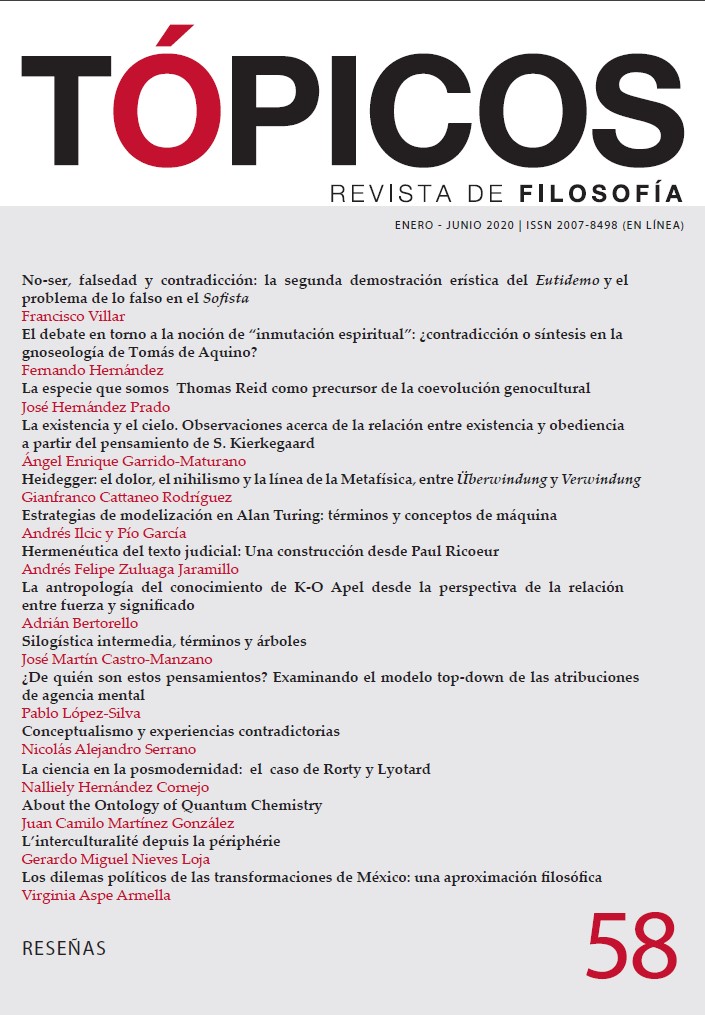Articles
The Debate around the Notion of “Spiritual Immutation”: Contradiction or Synthesis in Thomas Aquinas’s Gnoseology?
Published 2019-12-13
Keywords
- spirit,
- spiritual immutation,
- sensitive knowledge,
- intentionality
How to Cite
Hernandez, F. (2019). The Debate around the Notion of “Spiritual Immutation”: Contradiction or Synthesis in Thomas Aquinas’s Gnoseology?. Tópicos, Revista De Filosofía, 58, 39-53. https://doi.org/10.21555/top.v0i58.1120
Abstract
This work aims to contribute new elements to the debate which took place in Tópicos, Revista de Filosofía between Ezequiel Téllez Maqueo and Jörg Alejandro Tellkamp about Thomas Aquinas’s theory of sensitive knowledge. The concepts of spiritus and immutatio spiritualis will be the key to solve the dilemma between the coherence or inconsistency of that theory.
References
- Aristóteles. (1982). Metafísica de Aristóteles. V. García Yebra (trad.), Madrid: Gredos.
- Burnyeat, M. (2001). Aquinas on “Spiritual Change” in Perception. En D. Perler (ed.), Ancient and Medieval Theories of Intentionality. (pp. 129-53). Leiden: Brill.
- Cohen, S. (1982). St. Thomas Aquinas on the Immaterial Reception of Sensible Forms. Philosophical Review, 91, 193-209.
- De Anna, G. (2000). Aquinas on Sensible Forms and Semimaterialism. Review of Metaphysics, 54(1), 43-63.
- Feeley, T. (1965). “Spirituality” and Sensation. Laval théologique et philosophique, 21(2), 191-225.
- Haldane, J. (1983). Aquinas on Sense-Perception. Philosophical Review, 2, 233–240.
- Haldane, J. (1993). Mind-World Identity Theory and the Anti-Realist Challenge. En J. Haldane y C. Wright (eds.), Reality, Representation and Projection. (pp. 15-37). Oxford-Londres: Oxford University Press.
- Hoffman, P. (1990). St. Thomas Aquinas on the Halfway State of Sensible Being. Philosophical Review, 99, 73-92.
- Hoffman, P. (2014). Aquinas on Spiritual Change. En R. Pasnau (ed.), Oxford Studies in Medieval Philosophy. (pp. 98-103). Oxford-Londres: Oxford University Press.
- Macdonald, P. (2007). Direct Realism and Aquinas’s Account of Sensory Cognition. The Thomist, 71(3), 343-378.
- Moya Cañas, P. (1999). Dificultades que surgen en la comprensión del conocimiento sensible: una interpretación desde la recepción de Tomás de Aquino del “De anima”. Tópicos, Revista de Filosofía, 16, 87-123.
- Téllez Maqueo, E. (1997). Nota sobre la (no) espiritualidad en Aristóteles. Tópicos, Revista de Filosofía, 12, 97-117.
- Tellkamp, J. (1995). La teoría de la percepción de Tomás de Aquino: fuentes y doctrina. Universitas Philosophica, 25, 45-68.
- Tellkamp, J. (1998). Espíritu e inmutación espiritual: desarrollos y problemas en Tomás de Aquino. Tópicos, Revista de Filosofía, 15, 181-210.
- Tellkamp, J.(2006). Aquinas on Intentions in the Medium and in the Mind. Proceedings of the American Catholic Philosophical Association, 80, 275-289.
- Tomás de Aquino. (1968). De substantiis separatis. En Opera omnia iussu Leonis XIII P.M. edita. Vol. 40. Roma: Ad Sanctae Sabinae.
- Tomás de Aquino. (1929). Scriptum super Sententiis magistri Petri Lombardi. P. Madonnet (ed.), París: P. Lethielleux.
- Tomás de Aquino. (1984). Sentencia libri De anima. En Opera omnia iussu Leonis XIII P. M. Edita. Vol. 45/1. Roma-París: Commissio Leonina-J. Vrin.
- Tomás de Aquino. (1892). Summae Theologiae. En Opera omnia iussu Leonis XIII P. M. Edita. Vol. 7. Roma: Ex Typographia Polyglotta S. C. de Propaganda Fide.
- Tomás de Aquino. (2000). Quaestio disputata de spiritualibus creaturis. En Opera omnia iussu Leonis XIII P. M. edita, vols. 24/2. Roma-París: Commissio Leonina-Éditions du Cerf.
- Van Riet, G. (1953). La théorie thomiste de la sensation externe. Revue Philosophique De Louvain, 51(31), 374-408.






